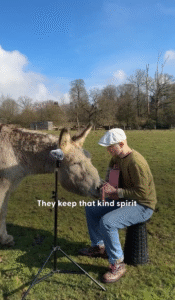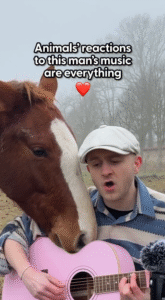
The Music That United the Wild
The man stood beneath a wide old oak tree, its branches stretching like protective arms over the clearing. In his hands rested a weathered guitar, the wood darkened by years of strumming and the gentle touch of his fingers. He began to play slowly, the notes soft at first, like a whisper testing the air. Soon, the melody grew warmer, richer, flowing outwards like ripples across a still pond. The breeze carried his music far into the forest, and something remarkable began to happen.
Birds in mid-flight paused, wings outstretched for a heartbeat, before drifting down to nearby branches as though pulled by an invisible thread. A family of deer emerged cautiously from between the trees, their hooves pressing gently into the grass, ears turning to catch each note. Squirrels stopped their frantic darting, holding acorns in still paws, their bright eyes fixed on the source of this strange, soothing sound.
The man’s voice soon joined the guitar, low and rich, weaving through the natural sounds around him — the occasional birdcall, the faint rustle of small animals in the undergrowth. It wasn’t just a song; it was a conversation without words, a bridge between his human heart and their wild ones. In that moment, the forest was no longer divided between man and animal. Everything — fur, feather, and flesh — seemed to breathe in unison, bound together by a song that needed no translation.
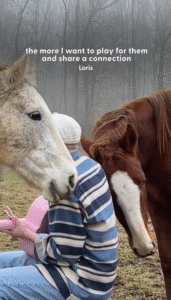
Playing to Touch Their Hearts
He had played to human crowds before — noisy rooms, polite applause, flashing cameras — but none of it felt like this. Out here, surrounded by unblinking eyes that held no judgment, only curiosity, the act of making music felt pure. When a small raccoon peeked out from behind a rock, its tiny hands clutching the mossy surface, he smiled and played softer, as though speaking directly to it. An owl, solemn and regal, swiveled its head slowly to watch him, its golden eyes bright against the fading light.
The connection was unlike anything he had ever known. Every chord seemed to send invisible threads between him and each creature, delicate but unbreakable. He noticed the rhythms of their bodies — the twitch of a squirrel’s tail in time with his strumming, the slow blink of a deer in the quiet moments between verses. Even the insects seemed to hum in harmony. This wasn’t performance; this was sharing.
With each encounter, the urge to return grew stronger. The forest became his stage, but also his refuge, a place where giving and receiving happened in perfect balance. He didn’t want to impress them — he wanted to know them, to learn their unspoken stories through the way they listened. And the more he played, the more those stories revealed themselves, hidden in every gaze, every tilt of the head, every moment of stillness.
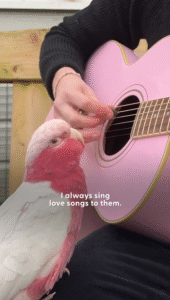
Songs of Affection in the Forest
One afternoon, as golden light filtered through the branches like a soft curtain, he shifted from wordless melodies to songs of love. These weren’t dramatic, sweeping ballads meant for grand stages, but quiet, tender tunes — songs of patience, loyalty, and warmth. His voice carried not just notes but meaning, the kind that lives in the spaces between words.
The effect was immediate.Birds joined in with chirps and whistles, filling the spaces between his verses like backup singers who knew the parts by heart. Even the shyer creatures — a fox with its cautious eyes, a pair of hedgehogs peeking from beneath a log — edged closer, as if drawn by something deeper than curiosity.
Love, he realized, wasn’t a concept that belonged only to humans. It existed here too — in the way a mother bird shielded her chicks from the wind, in the way two young deer moved in sync as they grazed. By singing love songs, he wasn’t introducing them to anything new; he was simply reflecting what was already there. The forest, it seemed, had always known how to love.
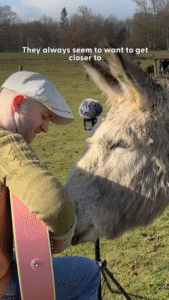
When the Wild Comes Close
Now, when he played, they came to him like waves rolling gently to shore. The deer stepped so close he could see the tiny flecks of gold in their eyes. Rabbits hopped forward, their noses twitching at the scent of the guitar’s wood.
One day, a young fox approached boldly, its fur catching the sunlight in a way that made it seem almost aflame. Without hesitation, it curled up at his side, tail wrapped neatly around its paws, head resting on the earth as his music washed over it. He didn’t reach out or move too quickly — the beauty was in their choice to come near. That choice, he knew, meant everything.
There was a kind of trust here that couldn’t be rushed. It was earned in the quiet moments, in the patience of simply being present. And as they closed the space between them, he understood that this nearness wasn’t about taming or ownership. It was about acceptance — the rare kind that asks for nothing in return.
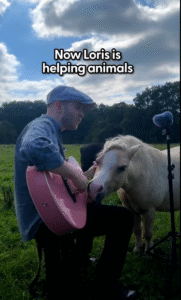
Now Loris is Helping the Animals
It wasn’t long before Loris joined him. She wasn’t a musician, but her gift was no less valuable. Loris had a way of noticing things others overlooked — the limp of a rabbit, the tangled feathers of a small bird, the thirst in the eyes of a deer.
While he played, she worked quietly among them. She set bowls of fresh water near the tree roots, placed berries and apples where foxes could find them, and knelt gently to free a bird’s wing from a stray vine. Sometimes, she spoke to them in a soft voice, as though explaining what she was doing, and they listened without fear.
Together, they formed an unspoken partnership. His music built trust; her care turned that trust into comfort. The clearing became more than a meeting place — it became a sanctuary. And in that sanctuary, the animals began to see humans not as intruders, but as companions.
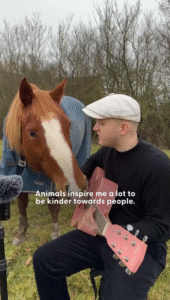
When Trust Spread Through the Forest
One morning, as they entered the clearing, he saw something that made him stop playing mid-chord. A young deer, one he recognized, was standing only a few feet from a small boy who had wandered into the woods. Instead of fleeing, the deer bent its neck and allowed the boy to touch its fur. The boy’s face lit up, and the man realized something extraordinary — the trust he had built was spreading.
It happened again and again. Birds landed on strangers’ shoulders without hesitation. Foxes watched hikers pass with quiet eyes instead of darting away. Even owls seemed less wary, allowing people to linger beneath their branches without complaint. The forest was learning, and not just from him.
Kindness, he saw, was contagious here. The animals were teaching each other that people could be safe, that interaction didn’t have to mean danger. It was a slow change, but a powerful one, reshaping the way the forest breathed.
